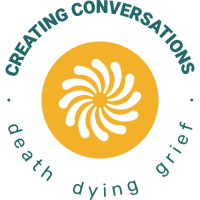The Wind Phone
At our Grief Cafes, people often share how they speak to their loved one—quietly, through their mobile and headphones, while out walking—as if the person were still alive. These conversations always remind me of the Wind Phone in Japan: a simple, disconnected telephone placed in a garden overlooking the sea, where words spoken into the receiver are carried, symbolically, on the wind. When an earthquake and tsunami struck Japan in 2011, 30ft (9.14m) waves obliterated coastal communities. The small town of Otsuchi lost everything including 2000 residents. One resident, Itaru Sasaki, was already grieving his cousin before the tsunami hit. He had the idea of nestling an old phone booth on the windy hill at the bottom of his garden which overlooked the Pacific Ocean. This would be a place he could go to speak to his cousin – a place where his words could ‘be carried on the wind.’ The white, glass-paned booth holds an old disconnected rotary phone. He called it his Wind Phone. In the aftermath of the terrible tsunami, as word of the phone spread, it became a pilgrimage site for those who had lost loved ones. In the sanctuary of the booth they would dial old phone numbers and talk to their loved ones. https://www.bbc.co.uk/reel/video/p07cj0h3/japan-s-telephone-to-the-dead
What Happens As We Die, Kathryn Mannix
Have we lost the practical wisdom of what happens as people die? With lessons from a career witnessing thousands of people’s final breaths, palliative care expert Kathryn Mannix urges us to demystify the experience of death, sharing how a better understanding of what actually happens can reduce fear in the final days, for you and your loved ones. https://www.ted.com/talks/kathryn_mannix_what_happens_as_we_die_sep_2023
The Paradox of Grief, Julia Samuel
Can pain do good? Julia Samuel explains that as a child she learnt that denial was the only way to manage sadness and loss. We will all grieve, yet we turn away from facing death, and are therefore ignorant and unable to help ourselves when it does happen. In this TED Talk Julia explains that grieving is a form of learning, and that pain, unfortunately, is the agent of change. Pain is the curative part of grief; it is how we heal. we adapt and grow through loss. We learn that the very thing we least want to do, is the very thing we most need to do. We also discover that our love for the person who dies remains, and even grows. When we allow ourselves to grieve we discover that we are forever changed by it, and that change is experienced as growth. So, yes, when it comes to grief, pain can do good. https://www.youtube.com/watch?v=P4PNNlGWq_Q
